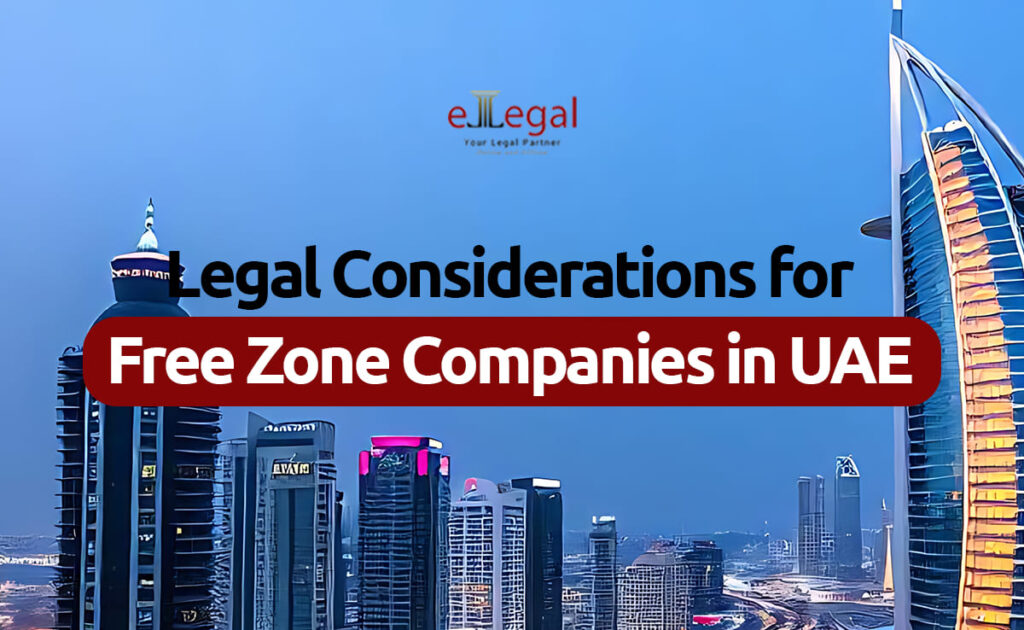When it comes to starting a business in the UAE, the concept of free zone companies has become incredibly popular. Offering numerous benefits such as tax exemptions, full foreign ownership, and streamlined processes, these zones are a magnet for entrepreneurs and multinational corporations alike. However, it’s crucial to understand the legal considerations that accompany forming a free zone company to avoid any unexpected hurdles.
This blog will walk you through the legal landscape for free zone companies, provide a breakdown of the different types of free zones available across the Emirates, and explain some of the most relevant legal implications you should be aware of when setting up and managing a free zone company in the UAE.
What is a Freezone
A free zone, or free trade zone, is a specially designated area in the UAE that allows businesses to operate under particular regulations aimed at enticing foreign investors. The key purpose is to attract global companies by offering attractive benefits like:
- 100% foreign ownership (unlike mainland companies that require a local sponsor)
- Full repatriation of profits
- Exemption from import and export taxes
- No personal or corporate income taxes for a specified period (usually 15 to 50 years)
- Simplified immigration and labor laws
Free zones have specific legal frameworks that govern them. These frameworks are distinct from those regulating mainland companies and can vary between different zones across the UAE.
Types of Free Zones in the UAE
Each emirate in the UAE has established free zones to cater to different types of industries. As a business owner, it’s essential to choose the right free zone that aligns with your industry and goals.
- Free Zone Companies in Abu Dhabi: Abu Dhabi is home to several prominent free zones, including Masdar City Free Zone, Abu Dhabi Global Market (ADGM), and Khalifa Industrial Zone Abu Dhabi (KIZAD). These free zones cater to diverse industries such as technology, finance, logistics, and energy. ADGM, for example, is well-known for its strong legal and regulatory framework for financial institutions, making it a prime choice for financial services companies.
- Freezone Companies in other Emirates: Free zones are not just limited to Abu Dhabi; they are located all over the UAE. Some key ones are the Jebel Ali Free Zone (JAFZA) in Dubai, the Hamriyah Free Zone in Sharjah, and the Ras Al Khaimah Economic Zone (RAKEZ). Each zone has its own set of advantages influenced by its location, industry focus, and cost. For example, RAKEZ is known for offering one of the cheapest free zone company setups in the UAE, making it a popular choice for startups and small businesses
- Specialized Free Zones: Free zones aren’t one-size-fits-all. Some free zones are specifically designed for niche industries. For instance, free zone construction companies in the UAE can benefit from operating in zones like Dubai South, which is tailored for logistics, aviation, and construction industries. Similarly, economic free zone companies in the UAE like those in Dubai International Financial Centre (DIFC) focus on providing financial services, offering specialized legal frameworks to manage complex transactions.
Legal Structure of Free Zone Companies
There are generally two types of business structures you can choose from when setting up a company in a UAE free zone:
- Free Zone Establishment (FZE)
This type of company can be formed by a single shareholder, either an individual or a corporate entity. - Free Zone Company (FZC)
This structure is used for companies that have more than one shareholder (up to five shareholders).
Legal Requirements for Setting Up a Free Zone Company in UAE
Although setting up a free zone company in the UAE is generally quicker and simpler than establishing a mainland company, there are still several legal requirements to consider:
- Identify the legal structure for your business: In a free zone, you have the option to establish one of two types of companies; Free Zone Limited Liability Company (FZ LLC) or a Free Zone Establishment (FZE).
- Choosing a Trade Name: As you consider what legal structure your business will adopt, it’s important to select a trade name. Typically, you should verify with the relevant free zone authority or the Department of Economic Development to see which trade names are allowed and if your desired name is already taken.
- Business Licensing: Every free zone company must obtain a business license from the free zone authority where it intends to operate. The license is specific to the type of activity the company will conduct, such as trading, consultancy, or industrial work. Some free zones have specialized licenses for certain industries, while others offer general licenses that cover multiple
- Office Space Requirements: Most free zones require companies to lease physical office space, although some zones offer virtual office packages for startups or freelancers. It’s crucial to understand the terms of the lease and any restrictions that come with it, as your business license will often be linked to your office space.
- Capital Requirements: Some free zones may have minimum capital requirements that need to be deposited before the company is incorporated. These requirements vary between free zones, so it’s essential to research this during the setup phase.
- Employment Regulations: Freezone companies are governed by the rules of the free zone, which may differ from federal labor laws. Employees in free zones typically have free zone-specific employment contracts that outline their rights, salary, and benefits.
Management of Freezone Companies
Operating a business in a free zone comes with legal responsibilities, particularly some management practices that need to be complied with
- Comply with Free Zone Regulations: Each free zone has its own regulatory body that oversees companies’ activities within its jurisdiction. These regulations cover areas such as financial reporting, audit requirements, and compliance with labor laws.
- Maintain Proper Licenses: Free zone companies must renew their business licenses annually. Failing to do so can result in penalties or the suspension of operations. It’s also essential to ensure that your activities are in line with the license issued by the free zone authority.
- Financial Reporting: Depending on the free zone, you may be required to submit annual audited financial statements. Companies that fail to submit these statements can face penalties or even lose their operating licenses.
- Corporate Governance: If you’re operating a large business, especially in sectors like finance or construction, corporate governance laws will play a crucial role in your operations. These rules are designed to ensure that your company operates transparently and that you comply with anti-money laundering (AML) and counter-terrorism financing (CTF) regulations.
Free Zone vs. Mainland: Key Legal Differences
One of the critical decisions you’ll face when starting a business in the UAE is whether to set up in a free zone or on the mainland. Here are some legal distinctions:
- Ownership: Free zone companies allow 100% foreign ownership, while mainland companies require a local partner or sponsor for most types of businesses, although for mainland companies some activities now allow for complete ownership thanks to the introduction of UAE Federal Law No. 19 of 2018 regarding Foreign Direct Investment.
- Business Operations: Free zone companies cannot conduct business directly with the UAE mainland without a local agent, whereas mainland companies can operate throughout the UAE.
- Taxation: While both free zone and mainland companies benefit from the UAE’s favorable tax regime, free zone companies enjoy specific tax exemptions that mainland companies may not.
Conclusion
The UAE’s free zones provide an excellent platform for businesses to flourish, thanks to their investor-friendly policies and efficient setup processes. However, navigating the legal landscape for free zone companies in UAE requires an understanding of the regulatory requirements and ongoing compliance obligations.
Whether you’re considering establishing a free zone company setup in UAE or managing an existing free zone business, understanding these legal considerations is crucial for success. Always consult with legal and business setup experts to ensure that your company remains compliant with the rules of the free zone in which you’re operating. We at eLegal Consultants have qualified professionals that can help you navigate any complex issue and provide guidance. Contact us now.




